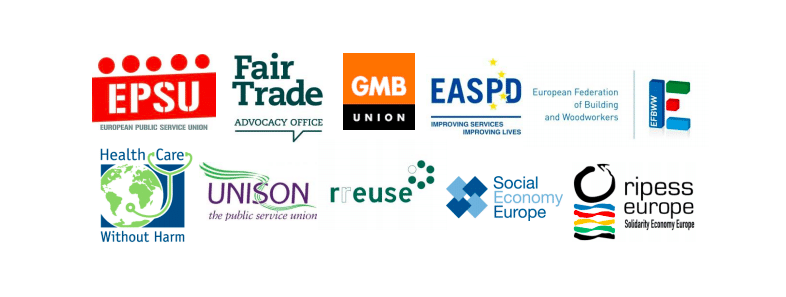Getting the most out of public money in support of Europe’s recovery
As representatives of social, environmental, business and trade union organisations, we welcome last week’s Conclusions from the European Council on how efficient public procurement rules and practices, combined with increased public spending, can accelerate the economic recovery from the COVID-19 crisis and lead to a sustainable and more resilient EU economy.
To maximise the ‘transformational power of public procurement’ every public contract financed by EU and national recovery and resilience funds should indeed contribute to sustainability. This represents the most ‘efficient’ use of public money. The 2014 public procurement Directives were a step forward in anchoring social and environmental sustainability standards in public procurement, but implementation of the positive elements of the Directives has been slow, or piecemeal. Nonetheless, we have seen many positive initiatives being taken by public authorities, social partners and others that shows that ambition is possible.
The Council Conclusions are a timely reminder that public authorities need to take an ambitious and coherent approach to social and environmental sustainability in public procurement. Now is the time to develop binding sustainability targets and commitments on public procurement!
Today, in the midst of the COVID-19 crisis it is urgent that every public contract financed by EU and national stimulus programmes is used as leverage to prevent abusive practices and to speed up a ‘people’s and planet recovery.’ Public spending must give a coordinated boost to advancing common priorities, including the European Green Deal, the European Action Plan for the Social Economy, the European Pillar of Social Rights (EPSR), the upcoming European Disability Strategy, the Climate Paris Agreement and EU objective to be climate neutral by 2050, and the Sustainable Development Goals (SDGs).
We urge the EU, national and local governments to implement the Council Conclusions on public procurement of 25 November in an ambitious manner and to champion “buy sustainable” Action Plans setting out specific conditions that all bidders will have to meet if they are to be awarded a public contract and giving preference to contracts that are more sustainable. All relevant social and environmental organisations should be properly involved in defining contract requirements and in selecting suppliers, service-providers and contractors.
The Action Plans should contain:
- Provisions on transparency, oversight, and anti-corruption. These are vital to prevent public support for nepotism, criminal organisations, tax dodgers, letter-box companies, or companies not complying with environmental, human rights and social and labour standards throughout the whole sub-contracting and supply-chain.
- Restrictions on the use of confidentiality requirements. Speedy procurement procedures need more public scrutiny, not less, and details of all public contracts must be public.
- Provisions to ensure that services provided directly by public authorities are not put out to tender for the sole reason of reducing labour costs and avoiding social obligations.
- …


